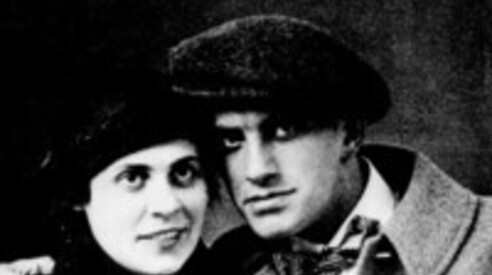The cold and sharp verses of a Mayakovsky of love, pain and abandonment


Mayakovsky and Lili Brik (photo Olycom)
The poem
Einaudi aims to refocus the gaze that has always been cast on the Russian poet, and presents "Di questo," a long love poem born of the bitter separation from his beloved Lili Brik. These verses filled the void of that distance, when he was "like a bear enraged to death."
Two authorial opinions about him, neither flattering . The first is from the stern and aristocratic Bunin. “Yesterday I attended the Wednesday meeting,” the Russian Nobel Prize winner wrote in his diary of the cursed days, those of the Bolshevik Revolution, published in a Parisian periodical in the early 1920s. “Many young people were present. Vladimir Mayakovsky maintained a fairly decent demeanor , although he did nothing but flaunt his idiotic sincerity of judgment: he wore a soft shirt without a tie and his jacket collar turned up, like those guys who live in squalid hotel rooms and in the morning, poorly shaved, head for the toilet.” We are faced with – let's put it this way – the recipe for Bunin's slap in the face: a long, dry-point line, flashing resentment and sarcasm that degenerates, both fueled by dark forebodings about the scenario that was unfolding in Russia and by the unmotivated enthusiasm of someone, for example , that very Vladimir Mayakovsky, bearer of an alien and crude language, always too attentive to the image he offered of himself, to his own ribald and streetwise, irreligious and revolutionary image – Mayakovsky, the hero of Mayakovsky's early poems, founder of the LEF, the Left Front of the Arts. "His verse is made for the street, to be shouted," wrote DP Mirsky in "The History of Russian Literature," underlining its "neurasthenic element" and celebrating its great value.
The second opinion was offered, in the form of a concise judgment that needed no further explanation, by the poet Sergei Yesenin . An interesting story is told about him: he tore up Mayakovsky's books whenever he found them. What a stunning image! And how beautiful a world in which poets hated each other, challenged each other to duels, and promised each other punches! (End of the tearful excerpt). It must be said that Yesenin's intolerance was reciprocated, since Mayakovsky considered Yesenin a "lyrical evil," and perhaps even a necessary one—in short, the two were absolutely incompatible.
But here, amidst old, handed-down skirmishes and tarnished holy cards, comes Einaudi. And in two close-range strokes , he aims to refocus the gaze that has always been lazily cast on the Russian poet most identified with the Soviet era . Today, after having published "Love Poems" a couple of years ago, he presents the new "Of This," a long love poem born of a bitter separation. That between the poet and Lili Brik , on Christmas 1922. After two months of separation imposed by her, the two went to Petrograd together.
On the train, Mayakovsky reeled off all the verses with which he had filled the void of that distance. From a sentimental point of view, it was only a few hundred meters of a boundless desert with little or no communication. Brik only allowed sporadically to use the phone: she lived with her husband. And meanwhile, in verse, Mayakovsky portrayed himself: “Like a bear / enraged to death / I press my chest against the telephone.” After his train recitation to his woman, he burst into tears. What a moment did we miss, all of us who weren't there? (Or just weren't.) Besides, one can't imagine a better situation than that for the declamation of a love's pain, condensed into such sharp and angular verses—tracks, cold, a train rattling, the broken and syntactical heartbeat of a lover crying in rhythm.
There is, in these pages, a cry that comes from another world and lands there , not shying away from derailing into intimate confession. "Where does this water come from? / Why so much? / It is I who wept it." And clear images, from the epic of the abandoned. "On the ice-pillow / feverish." Reading a Maykovsky of love —which is never just about love but about everything else, about all the time before and all the world to come— takes us back to the roots of the meaning of what great poetry does: making an appointment with eternity.
More on these topics:
ilmanifesto





